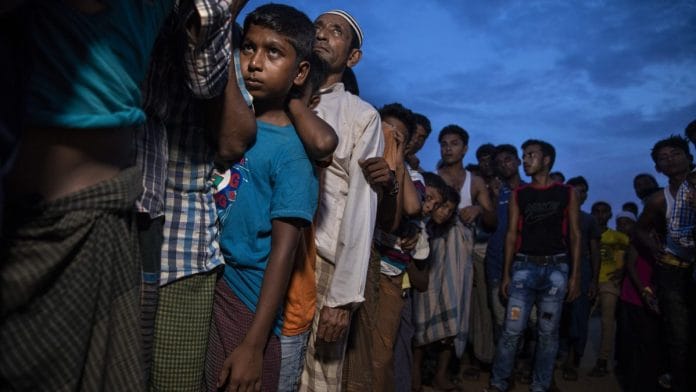It may be too little, too late, but it is more than what our governments are doing.
The latest participant in the world of internet governance is Facebook, which blocked 18 accounts from Myanmar, including that of its commander-in-chief Senior Gen. Min Aung Hlaing who will be investigated for his role in the genocide against Rohingya Muslims.
A UN report earlier this week indicted several generals from Myanmar for war crimes and ethnic violence against the Rohingyas. The report also mentioned the role of social media in spreading hate.
Twenty four hours after the report was released, Facebook, without consulting the Myanmar government, blocked 18 accounts, one Instagram account, and 52 pages. These had millions of followers.
Also read: Gutted Delhi camp puts spotlight on sub-human living conditions of Rohingyas in India
Meanwhile, Aung San Suu Kyi, Nobel Peace Prize winner, continues to maintain radio silence on the issue. Prime Minister Narendra Modi echoed her silence when he visited Myanmar last year when the Rohingya crisis was worsening. Modi, in a joint statement, said that India would stand by Myanmar amid the “challenges” it was facing.
Considering India is a major power in the region, we took very little note of what was happening in Myanmar, and even lesser efforts to do something about it. Later, the government did carry out “Operation Insaniyat” to provide humanitarian assistance to Bangladesh after the influx of Rohingya Muslims.
Is that the strongest stand the Prime Minister of a regional superpower could take?
It is understandable that India did not want a strained relationship with the Myanmar government while China spreads its claws in South Asia. It also wants to enhance its presence in Myanmar through its Act East policy. India had projects at stake, but humanity too was at stake here.
Also read: Are the Rohingya Muslim refugees a security threat? Can India deport them?
Facebook’s stance was, therefore, refreshing. But the company has been called out for doing too little, too late.
Facebook and social media platforms had a major part to play in spreading the atmosphere of hate in Myanmar. For years, it ignored both warnings and data that its platform was being used to fuel sectarian tensions in the country. The hypocrisy of the move to ban accounts now seems like Facebook is covering its tracks. But the fact that it finally woke up and did something—blocked a major channel of hate— is commendable.
More and more tech companies like Google, Apple and other homegrown ones like Paytm and Flipkart are now acting faster than most governments during a humanitarian crisis. Most apps set up donation options for the devastating Kerala floods while states and the Centre were caught in a tussle over funds. WhatsApp is taking measures to at least attempt to stop the spread of hate and fake news so that lynching and riots can be avoided in India
It seems that companies are taking a stronger stance addressing humanitarian issues than our very own governments who were actually elected to do it.







Rohingya Muslims are a 100% Bangladeshi Muslims. They are invading Myanmar and neighbouring states India. They should go back to Bangladesh.
One of the great human tragedies of our time. Ms Suu Kyi is toast in the civilised world.